Managing in Turbulent Times
by Peter Drucker — his other books

#Note the number of books about Drucker ↓
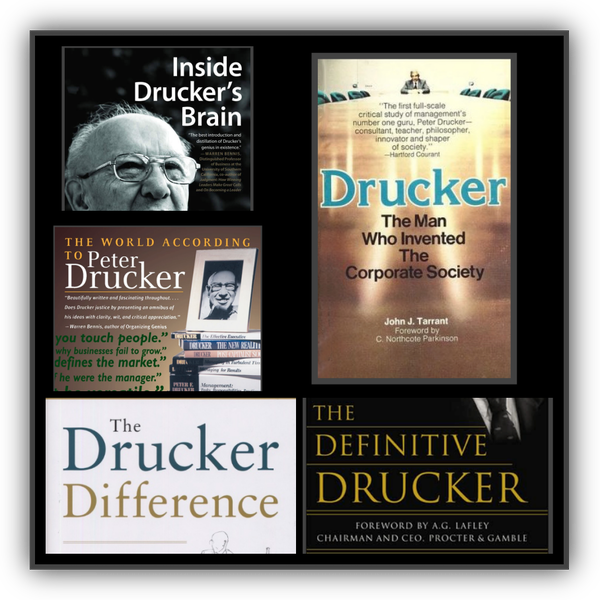
My life as a knowledge worker
Drucker: a political or social ecologist ↑ ↓
“I am not a ‘theoretician’;
through my consulting practice
I am in daily touch with
the concrete opportunities and problems
of a fairly large number of institutions,
foremost among them businesses
but also hospitals, government agencies
and public-service institutions
such as museums and universities.
And I am working with such institutions
on several continents:
North America, including Canada and Mexico;
Latin America; Europe;
Japan and South East Asia.
Still, a consultant is at one remove
from the day-today practice —
that is both his strength
and his weakness.
And so my viewpoint
tends more to be that of an outsider.”
broad worldview ↑
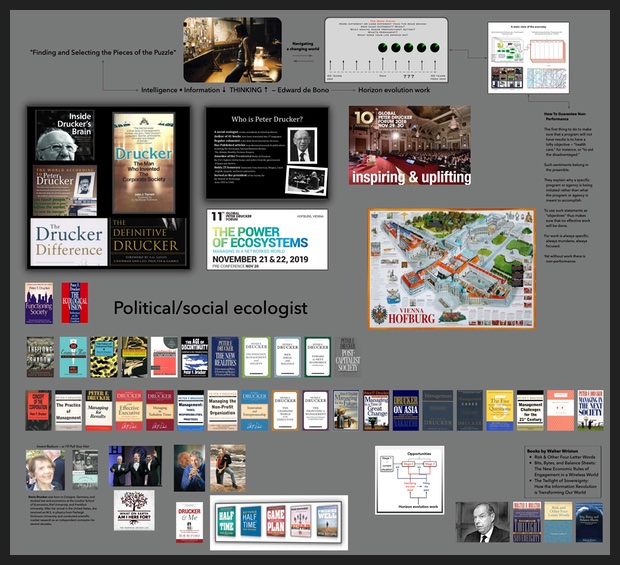
#pdw larger ↑ ::: Books by Peter Drucker ::: Rick Warren + Drucker
Books by Bob Buford and Walter Wriston
Global Peter Drucker Forum ::: Charles Handy — Starting small fires
Post-capitalist executive ↑

Learning to Learn (ecological awareness ::: operacy)
The MEMO they don’t want you to see

See rlaexp.com initial bread-crumb trail — toward the
end of this page — for a site “overview”
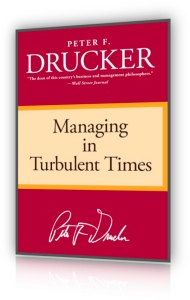
Amazon link: Managing in Turbulent Times
See about management

Introduction
This book focuses on actions, strategies, opportunities.
It focuses on what managers can do, should do, must do.
The one certainty about the times ahead, the times in which managers will have to work and perform, is that they will be turbulent times.
And in turbulent times, the first task of management is to make sure of the institution’s capacity for survival, to make sure of its structural strength and soundness, of its capacity to survive a blow, to adapt to sudden change, and to avail itself of new opportunities.
“May you live in interesting times” says an ancient Chinese curse.
There have never been more “interesting times” than the closing years of the twentieth century.
This is what this book anticipated when I first wrote it, fifteen years ago.
But the times since have been even more interesting—and therefore even more turbulent—than anyone then could have expected.
Then the Berlin Wall was still standing and the Soviet empire looked like a solid monolith.
The European Economic Community was still political manifesto more than economic reality.
Not even a lunatic could have predicted then that Mexico would jettison its hundred and fifty years of isolationism and would decide to integrate itself into the economy of the heated and feared “Yangis” to the north.
Japan, though already an economic colossus, still had a substantial trade deficit with the U.S. and Japanese-made automobile exports barely had begun.
And while quite a few of us then foresaw the economic collapse of Spanish America’s economies after two decades of gross misgovernment and reckless foreign borrowing, no one could have possibly foreseen that long-term economic drunkards such as Argentina would suddenly sober up, let alone how incredibly fast their turnaround would be.
Surely we are still very far from any “settling down” of world polity, world economy, or technology.
Indeed, as I explained in my most recent (1993) book Post-Capitalist Society, we are at best only halfway through one of the major transformations in world history.
It is thus imperative today for managers and executives of all organizations—businesses, universities, hospitals, government agencies, labor unions—to know how to manage in turbulent times.
This book is therefore perhaps even more appropriate now than it was when it first appeared.
There is one overall “text” on which this book preaches.
It is
“Don’t be clever, be conscientious.”
Predicting the future can only get you into trouble.
The task is to manage what there is and to work to create what could and should be.
There are no miracle cures in this book, no quick fixes.
Indeed, this book asks what work must be done.
The controlling word is “must.”
Executives are not in control of the universe any more than other mortals are.
But executives are accountable for the survival of the organization in their keeping, for its ability to perform, for its results.
While we cannot foretell the future, we can identify important developments that already have happened and will have major—and predictable— future impacts.
Any attempt to manage in turbulent times must start with the most predictable of all developments: demographics.
Anyone in the workforce of a developed country by the year 2010 is already born.
And the single most important development of this century will surely not he reversed: the shift from manual work to knowledge work as the central resource of a developed economy and to knowledge workers as the central work force.
The work force that today’s and tomorrow’s executives have to manage and have to make productive is very different indeed from the work force in which today’s executives began their careers themselves twenty or twenty-five years ago.
But so is the economy.
Not only has the center of gravity shifted from mechanical industries to knowledge-based industries, but it has shifted altogether from industries that make or move things to services of all kinds.
And it has shifted from national to regional economies and to transnational economies, with money and information having become truly transnational.
As everybody knows, we are in the midst of as great a technical transformation as was the first industrial revolution two hundred years ago and the second one—the one ushering in steel, chemicals, and electricity—a hundred and fifty years ago.
To manage in turbulent times, therefore, means to face up to the new realities.
It means starting out with the question: What is the world really like? rather than with assertions and assumptions that made sense only a few years ago.
In the twenty-five years after World War II planning became fashionable.
But planning, as commonly practiced, assumes a high degree of continuity.
Planning starts out, as a rule, with the trends of yesterday and projects them into the future using a different “mix” perhaps, but with very much the same elements and the same configuration.
This is no longer going to work.
The most probable assumption in a period of turbulence is the unique event that changes the configuration—and unique events cannot, by definition, he planned.
But they can often be foreseen.
This requires strategies for tomorrow, strategies that anticipate where the greatest changes are likely to occur and what they are likely to be, strategies that enable a business—or a hospital, a school, a university—to take advantage of new realities and to convert turbulence into opportunity.
This book deals with the strategies needed to use rapid changes as opportunities, the strategies needed to convert the threat of change into opportunities for productive and profitable action, and for contribution alike to society, economy, and individual.
A time of turbulence is a dangerous time, but its greatest danger is a temptation to deny reality.
The new realities fit neither the assumptions of the left nor those of the right.
They do not mesh at all with “what everybody knows.”
They differ even more from what everybody, regardless of political persuasion, still believes reality to be.
“What is” totally differs from what both right and left believe “ought to be.”
The greatest and most dangerous turbulence today results from the collision between the delusions of the decision makers—whether in governments, top managements of businesses, or union leadership-and the realities.
But a time of turbulence is also one of great opportunity for those who can understand, accept, and exploit the new realities.
It is above all a time of opportunity for leadership.
One constant theme of this book is therefore the need for the decision maker in the individual enterprise to face up to reality and to resist the temptation of “what everybody knows,” the temptation of the certainties of yesterday, which are out to become the deleterious superstitions of tomorrow.
This book discusses the new realities.
But it is concerned with action rather than understanding, with decisions rather than analysis.
It is not a “philosophical” book, nor does it ask “Where are we going?”
It aims at being practical, a work for the decision maker in whatever field of management, public or private.
It is not a “how to” book.
Rather, it tries to tell executives what to do
- Introduction
- 1. Managing the Fundamentals
- Adjusting for Inflation
- Managing for Liquidity and Financial Strength
- Managing Productivities
- The Productivity of the Knowledge Worker
- The Costs of Staying in Business vs. the Delusion of Profit
- 2. Managing for Tomorrow
- Concentrating Resources on Results
- Sloughing Off Yesterday
- Managing Growth
- Managing Innovation and Change
- Business Strategies for Tomorrow
- A Scorecard for Managers
- 1. Performance in appropriating capital
- 2. Performance in people decisions
- 3. Performance in innovation
- 4. Strategies versus performance
- 3. Managing the Sea-Change: The New Population Structure and the New Population Dynamics
- The New Realities
- The Unique Russian Dilemma
- The End of the Migrations
- Production Sharing: The Transnational Integration
- The Need for New Theories, New Concepts, and New Measurements
- From Multinational Corporation to Transnational Confederation
- The New Consumer Markets
- The Implications for Managerial Strategies
- From “Labor Force” to “Labor Forces”
- The Misleading Unemployment Figures
- The Need for Different Personnel Policies
- —And for Benefit Options
- The End of Mandatory Retirement Age
- The Need for a Second Career
- The “Double-Headed Monster”
- Job Needs in the Developing Countries
- Job Needs in the Developed World
- The Need for Redundancy Planning
- 4. Managing in Turbulent Environments
- The Integrated World Economy
- Transnational World Money
- The End of Sovereignty
- The Fractured World Polity
- The World Economy’s Almost-Developed Countries
- Business Policies for the World Economy
- The Employe Society
- The Employed Middle Class
- “Power Follows Property”
- And Responsibility Follows Knowledge
- Can the Labor Union Survive?
- Business Enterprise as a Political Institution
- The Society of Institutions
- The Power of the Small Minority
- Managing in a Political Environment
- The Manager as Political Activist
- Conclusion: The Challenge to Management

The following ↓ is a condensed strategic brainscape that can be explored and modified to fit a user’s needs
The concepts and links below ↓ are …
major foundations ↓ for future directed decisionS
aimed at navigating
a world constantly moving toward unimagined futureS ↓

YouTube: The History of the World in Two Hours
— beginning with the industrial revolution ↑ ↓
Management and the World’s Work
↑ In less than 150 years, management ↑ has transformed
the social and economic fabric of the world’s developed countries …
“Your thinking, choices, decisions are determined by
what you have seen” edb

Take responsibility for yourself and
don’t depend on any one organization ↑ ↓ (bread-crumb trailS below)
We can only work on the thingS on our mental radar ↑ at a point in time ↓
About time ↓ The future that has already happened
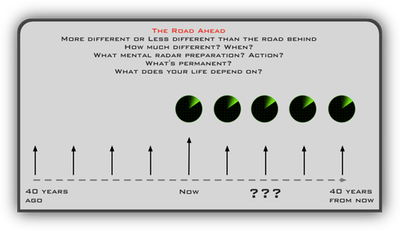
The economic and social health of our world
depends on
our capacity to navigate unimagined futureS
(and not be prisoners of the past)
The assumption that tomorrow is going to be
an extrapolation of yesterday sabotages the future — an
organization’s, a community’s and a nation’s future.
The assumption ↑ sabotages future generations — your children’s,
your grandchildren’s and your great grandchildren’s — in
spite of what the politicians say …
The vast majority of organization and political power structures
are engaged in this ↑ futile mind-set …
while rationalizing the evidence
The future is unpredictable and that means
it ain’t going to be like today
(which was designed & produced yesterday)
The capacity to navigate is governed by what’s between our ears ↑ ↓

When we are involved in doing something ↑
it is extremely difficult to navigate
and very easy to become a prisoner of the past.
We need to maintain a pre-thought ↓
systematic approach to work and work approach ↓
Click on either side of the image below to see a larger view
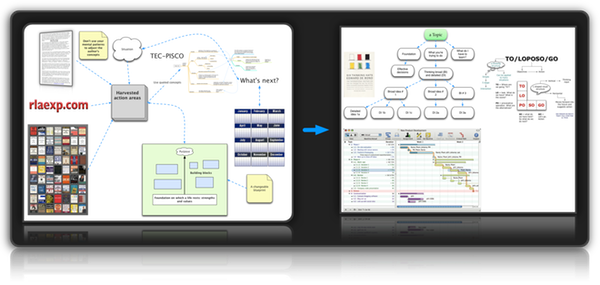
based on reality →
the non-linearity of time and events
and the unpredictability of the future
with its unimagined natureS. ↓ ↑
(It’s just a matter of time before we can’t get to the future
from where we are presently)
Foundations and opportunities ::: larger view ↓
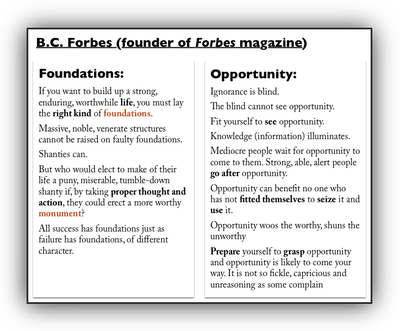
Intelligence and behavior ↑ ↓ ← Niccolò Machiavelli ↑ ↓
Political ecologists believe that the traditional disciplines define fairly narrow and limited tools rather than meaningful and self-contained areas of knowledge, action, and events … continue
❡ ❡ ❡
Foundational ↑ Books → The Lessons of History — unfolding realities (The New Pluralism → in Landmarks of Tomorrow ::: in Frontiers of Management ::: How Can Government Function? ::: the need for a political and social theory ::: toward a theory of organizations then un-centralizing plus victims of success) ::: The Essential Drucker — your horizons? ::: Textbook of Wisdom — conceptual vision and imagination tools ::: The Daily Drucker — conceptual breadth ::: Management Cases (Revised Edition) see chapter titles for examples of “named” situations …

What do these ideas, concepts, horizons mean for me? continue
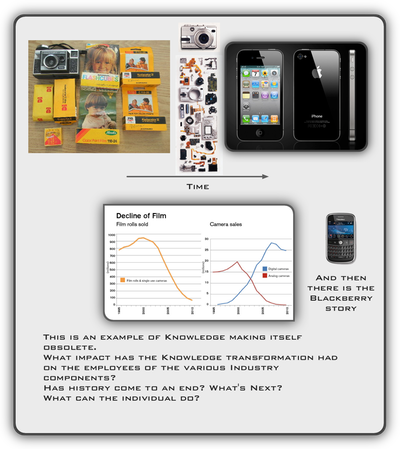
Society of Organizations
“Corporations once built to last like pyramids
are now more like tents.
Tomorrow they’re gone or in turmoil.”

“The failure to understand the nature, function, and
purpose of business enterprise” Chapter 9, Management Revised Edition
“The customer never buys ↑ what you think you sell.
And you don’t know it.
That’s why it’s so difficult to differentiate yourself.” Druckerism
“People in any organization are always attached to the obsolete —
the things that should have worked but did not,
the things that once were productive and no longer are.” Druckerism
Why Peter Drucker Distrusted Facts (HBR blog) and here
Best people working on the wrong things continue
Conditions for survival
Going outside
Making the future — a chance for survival ↑
“For what should America’s new owners, the pension funds,
hold corporate management accountable?” and
“Rather, they maximize the wealth-producing capacity of the enterprise”
Search for the quotes above here
Successful careerS are not planned ↑ here and ↓
What do these issues, these challenges mean for me & … — an alternative
Exploration paths → The memo they don’t want you to see ::: Peter Drucker — top of the food chain ::: Work life foundations (links to Managing Oneself) ::: A century of social transformation ::: Post-capitalist executive interview ::: Allocating your life ::: What executives should remember ::: What makes an effective executive? ::: Innovation ::: Patriotism is not enough → citizenship is needed ::: Drucker’s “Time” and “Toward tomorrowS” books ::: Concepts (a WIP) ::: Site map a.k.a. brainscape, thoughtscape, timescape
Just reading ↑ is not enough, harvesting and action thinking are needed … continue
Information ↑ is not enough, thinking ↓ is needed … first then next + critical thinking
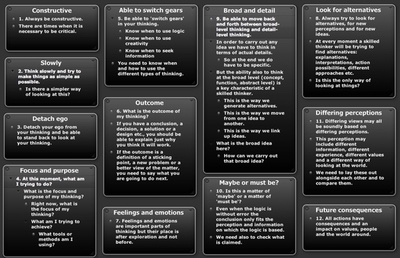
Larger view of thinking principles ↑ Text version ↑ :::
Always be constructive ↑ What additional thinking is needed?
Initially and absolutely needed: the willingness and capacity to
regularly look outside of current mental involvements continue
bread-crumb trail end

Peter Drucker: Conceptual Resources
The Über Mentor
A political / social ecologist
a different way of seeing and thinking about
the big picture
— lead to his top-of-the-food-chain reputation
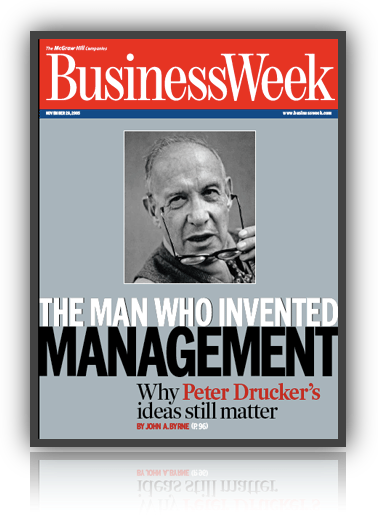
about Management (a shock to the system)
“I am not a ‘theoretician’; through my consulting practice I am in daily touch with the concrete opportunities and problems of a fairly large number of institutions, foremost among them businesses but also hospitals, government agencies and public-service institutions such as museums and universities.
And I am working with such institutions on several continents: North America, including Canada and Mexico; Latin America; Europe; Japan and South East Asia.” — PFD

List of his books
Large combined outline of Drucker’s books — useful for topic searching.

“High tech is living in the nineteenth century,
the pre-management world.
They believe that people pay for technology.
They have a romance with technology.
But people don't pay for technology:
they pay for what they get out of technology.” —
The Frontiers of Management

|
![]()
